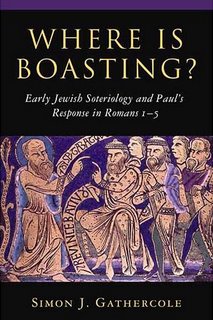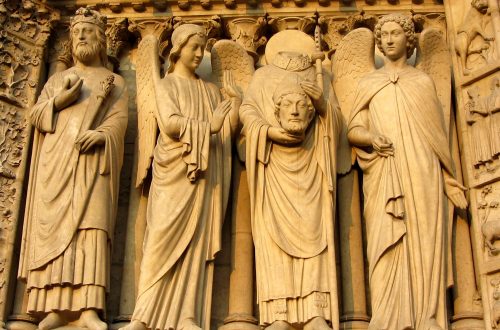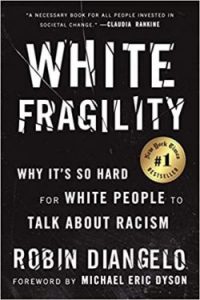 Simon J. Gathercole fires a salvo into the ongoing battle over Paul’s doctrine of Justification and the new perspective on Paul. In Where Is Boasting: Early Jewish Soteriology and Paul’s Response in Romans 1-5, Gathercole contends with the growing consensus among Pauline scholars that the Judaism of Paul’s day was not a legalistic religion of merit, but a gracious dispensation of covenantal election. This work represents Gathercole’s Ph.D. dissertation which he wrote under the supervision of James D. G. Dunn, with whom Gathercole is in decided disagreement.
Simon J. Gathercole fires a salvo into the ongoing battle over Paul’s doctrine of Justification and the new perspective on Paul. In Where Is Boasting: Early Jewish Soteriology and Paul’s Response in Romans 1-5, Gathercole contends with the growing consensus among Pauline scholars that the Judaism of Paul’s day was not a legalistic religion of merit, but a gracious dispensation of covenantal election. This work represents Gathercole’s Ph.D. dissertation which he wrote under the supervision of James D. G. Dunn, with whom Gathercole is in decided disagreement.
Gathercole argues that E. P. Sanders’ scheme of “getting in†and “staying in†has very little eschatology (p. 23). That is, Jewish soteriology was based not merely on divine election (à la covenantal nomism), but also on final salvation by works (à la eschatological judgment). According to Gathercole, new perspective scholars have overemphasized the former at the expense of the latter. Gathercole attempts to show that the evidence of second-Temple Jewish literature paints a different picture.
Gathercole traces the theme of “boasting†in second-Temple Jewish texts (Part 1) and in Paul’s argument in Romans 1-5 (Part 2). He shows that “boasting†in Paul and the Jewish literature refers to “confidence of vindication in the final judgment†(p. 23). Such “boasting†relies on obedience to the totality of Jewish law as the condition of and basis for final vindication in the final judgment. For Gathercole, salvation in Judaism, contrary to new perspective scholarship, does rely on works of obedience.
Gathercole’s work is important because it challenges one of the central claims of New Perspective proponents. They have alleged that the Judaism of Paul’s day was not legalistic because “legal works†were not viewed as the basis for “getting into†a right relationship with God. “Legal works†were merely a means of “staying in†that right relationship.
Gathercole has shown that second-Temple Judaism did indeed hold to a final salvation for the righteous on the basis of works (p. 266). In other words, New Perspective scholars have emphasized the gracious character of Israel’s election at the expense of the legal works that are required for one to stand at the final judgment.
In many ways, what Gathercole has done is to balance the scales a little bit. He shows that there has been somewhat of a false antithesis between election and legalism in descriptions of first century Judaism. For Gathercole, Jewish soteriology is based both on divine election and on eschatological salvation by works (p. 33). Any description of Judaism that fails to emphasize both is not being faithful to the sources.
Some reviewers of Gathercole’s work allege that New Perspective scholars have always given eschatological salvation by works its proper place in describing Jewish soteriology. But this reviewer disagrees with that assessment. New Perspective proponents rarely if ever give proper weight to the indications that Judaism was in some sense legalistic. Gathercole offers a needed course correction in this respect.
This is a valuable book and a must read for anyone who is interested in getting outside of the echo-chamber that is modern Pauline scholarship. Gathercole has made his point—rather, the sources have made their point, and every New Testament scholar would do well to hear them.




2 Comments
Barry Joslin
Denny,
Gathercole’s work is an important one. Tom Schreiner pointed it out to me in the early stages of my dissertation, and it proved to be quite helpful in my second chapter on the Law in Second Temple Judaism. His work, along with Elliott’s Survivors of Israel are two of the newer and better treatments on this ongoing issue, and have proven helpful to counter the influence of NPP. Kudos to Gathercole. The evidence does in fact support a more traditional and long-held view of a legalistic bent in Judaism of the period. Thanks for the good review. I hope that many will take up and read his work.
Barry
TM Law
You should read Dunn’s newest book which is a collection of all of the writings he has written on the NP, but the first 80 pages or so is a ‘state of the union’ address to put the debate in perspective. I would be very interested to see you interact with that material as he clearly undercuts many of Gathercole’s arguments.
I like Gathercole as a person and a scholar. No offense to him, but Dunn outclasses him in the scholarly debate by a mile. There is no question Dunn has made the evangelical world unsettled, and I am certainly glad he has.